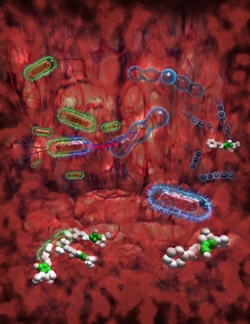 The Scientist | The millions of microbes that crowd the human intestinal tract are teeming with new antibiotic resistance genes that could jump to disease-causing pathogens, according to researchers from Harvard University.
The Scientist | The millions of microbes that crowd the human intestinal tract are teeming with new antibiotic resistance genes that could jump to disease-causing pathogens, according to researchers from Harvard University.They found more than 90 undiscovered bacterial genes capable of conferring antibiotic resistance hiding in microbes harvested from two healthy adults. They report their findings in Science today (August 27).
"I thought this was an incredibly cool story," Gerry Wright, McMaster University chemical biologist, told The Scientist. "It tells you just how ignorant we are of microbial ecology."
Wright, director of McMaster's Michael G. DeGroote Institute for Infectious Disease Research, said that the findings raise several key questions. "If there's so much resistance out there, how come [antibiotics] work at all?" asked Wright, who was not involved with the study. "It either means that we really don't understand how antibiotics work or we really don't understand how microbes work."
This lack of understanding is underscored by the fact that humans have exposed their bodies to a potentially dangerous flood of antibiotics -- directly in medicines and indirectly through agriculture and cleaning products -- for decades. This exposure has likely selected for the newly discovered antibiotic resistance genes in our internal microbiome, according to lead author Morten Sommer, a postdoc in Harvard geneticist George Church's lab. "And that could be a problem when the microbiome interacts with disease-causing microbes," he told The Scientist.


0 comments:
Post a Comment